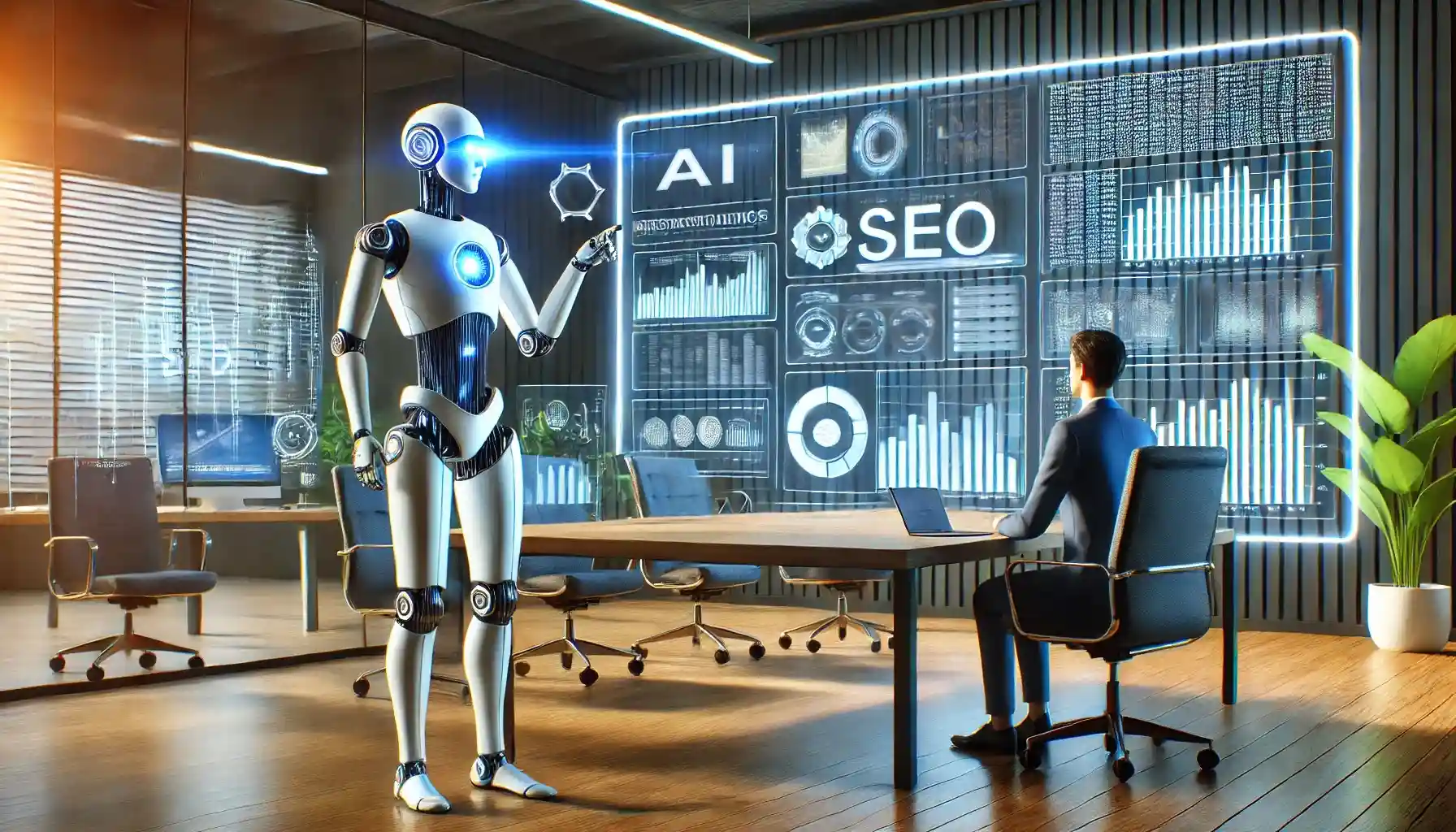
Introduction to AI SEO
As the owner of a digital marketing agency focused on B2B software companies, I’ve witnessed firsthand how artificial intelligence has fundamentally transformed search engine optimization. AI SEO represents the convergence of machine learning, natural language processing, and predictive analytics to revolutionize how we approach digital visibility. In this introduction to AI SEO, I’ll be covering a number of topics that all B2B marketers should be aware of moving into 2025 and beyond.
Think of AI SEO as your intelligent digital strategist – one that processes millions of data points in seconds to uncover patterns, predict trends, and automate time-consuming optimization tasks. This isn’t just about working faster; it’s about working smarter to achieve better results for our clients.
The impact of AI on SEO goes far beyond basic keyword research and content optimization.
Today’s AI-powered tools can:
For B2B software companies especially, AI SEO has become indispensable for staying competitive in increasingly complex search landscapes. AI technology helps us move beyond traditional optimization methods to create more sophisticated, data-driven strategies that drive measurably better organic search rankings.
What makes AI SEO particularly powerful is its ability to adapt and learn continuously. As search engines become more capable of understanding user intent and delivering personalized results, AI tools evolve alongside them, ensuring our optimization strategies remain effective and future-proof.
Understanding AI in SEO
AI SEO isn’t just another buzzword – it’s a wholly different approach to search optimization. The convergence of artificial intelligence and traditional SEO practices spawned a data-forward approach to optimizing visibility that is at once more nuanced and brutally powerful.
What Sets AI SEO Apart
At its core, AI SEO harnesses the power of machine learning and natural language processing to decode search patterns and user behavior at a scale that would be impossible for human analysts. AI is better at finding patterns in data than legacy statistical methods, even for small data sets. AI can process millions of data points to uncover previously invisible insights that drive strategic decisions and automate time-consuming tasks.
Why AI SEO Matters Now
The search landscape is evolving at an accelerating pace. Google’s algorithms have become increasingly clever, using AI to understand context, intent, and the relationships between topics. This evolution means traditional keyword-focused SEO strategies are no longer sufficient. Modern SEO requires a deep understanding of:
- Semantic search relationships
- User intent patterns
- Content relevance signals
- Behavioral analytics
- Predictive trend analysis
Real-World Impact
In our agency’s work with B2B software companies, we’ve seen AI SEO tools transform content strategy from guesswork into a data-driven science. These tools help us:
- Predict which topics will resonate with specific audience segments
- Identify content gaps that competitors haven’t addressed
- Optimize content for voice search and featured snippets
- Automate technical SEO audits and improvements
- Generate real-time insights for content optimization
The integration of AI in SEO isn’t just about keeping up with technology – it’s about gaining a competitive edge in an increasingly complex digital landscape. Embracing AI-powered SEO strategies isn’t optional; it’s essential for maintaining and improving search visibility. This is not about bragging rights to using the latest tech fashion, it is about survival in a tsunami of computing power never before envisioned.
Key Benefits of AI SEO
The benefits of AI SEO extend far beyond simple automation, creating opportunities for more strategic and impactful marketing decisions.
Data-Driven Keyword Discovery
Recent studies show that companies leveraging AI in their SEO strategies have seen an average improvement of 30% in search engine rankings within six months. Our agency has experienced similar results, with AI helping us uncover niche keyword opportunities that traditional research might have missed.
Intelligent Content Enhancement
AI doesn’t just suggest keywords – it helps create content that genuinely resonates with both search engines and users. Through sophisticated natural language processing, these tools analyze top-performing content and provide actionable insights for improvement.
This has allowed us to:
- Identify content gaps in competitive landscapes
- Optimize existing content for better performance
- Create more comprehensive topic clusters
In summary, the Google-Reddit licensing deal has enhanced Google’s search capabilities and provided Reddit with substantial financial benefits. However, it has also contributed to a more exclusive and fragmented internet environment, affecting the dynamics of data accessibility and competition among search engines.
Automated Performance Analysis
One of the most powerful advantages of AI SEO is its ability to generate actionable insights. AI tools can identify and address technical SEO issues within your CMS, ensuring optimal website performance for search engines. This automation has freed up our team to focus on strategic planning and creative development.
Enhanced User Experience Optimization
By leveraging machine learning algorithms, AI can analyze user behavior patterns to optimize website structure and content delivery. About 60% of users now use voice search to quickly access content, making AI’s ability to optimize for natural language queries increasingly valuable.
Strategic Forecasting
Perhaps most importantly, AI empowers us to be active rather than reactive in our SEO strategies. Through predictive analytics, we can anticipate market trends and algorithm updates, allowing us to adjust our strategies before competitors catch on. This forward-thinking approach has been crucial in maintaining competitive advantages for our B2B software clients.
The integration of AI in SEO is one of the most compelling advancements in the history of digital marketing. When implemented thoughtfully, AI SEO tools can enhance every aspect of your digital marketing strategy while freeing up valuable time for creative and strategic thinking.
Best Practices for Implementing AI SEO
Here’s how to maximize your AI SEO efforts effectively:
Strategic Tool Integration
Rather than rushing to adopt every new AI tool, focus on integrating solutions that address your specific needs. In our agency, we’ve found that starting with core functionalities like content optimization and keyword research provides the strongest foundation. This approach has helped our clients achieve an average of 40% improvement in organic visibility within the first six months.
Intent-First Content Strategy
AI tools excel at decoding user intent patterns, but the key is applying these insights strategically. We recommend:
- Using AI to analyze search patterns across your target market
- Creating content clusters that address different stages of the buyer’s journey
- Optimizing existing content based on actual user behavior data
Dynamic Content Management
Modern AI tools can identify content performance patterns that human analysts might miss. Implement a systematic approach to content updates by:
- Setting up automated content audits every quarter
- Using AI to identify underperforming pages
- Leveraging predictive analytics to spot emerging topic opportunities
Performance Tracking Framework
Establish a comprehensive monitoring system that tracks both technical and engagement metrics. Our most successful implementations focus on:
- Core Web Vitals optimization
- User engagement metrics
- Conversion path analysis
- Search visibility trends
Continuous Learning and Adaptation
The AI SEO landscape evolves rapidly, but not every new development warrants immediate action. Focus on:
- Testing new AI features in controlled environments
- Documenting the impact of AI-driven changes
- Scaling successful implementations across your content strategy
Remember, effective AI SEO implementation isn’t about replacing human expertise – it’s about enhancing it. By combining AI capabilities with strategic thinking and industry knowledge, you can create a more powerful and sustainable SEO strategy.
Looking Ahead: The Future of AI SEO
While this has simply been an introduction to AI SEO, the future of SEO is still a bit uncertain. It’s easy to assume that AI SEO lies at the intersection of human creativity and AI capabilities. I’ve seen how AI tools can amplify our strategic thinking, not replace it. The most successful implementations have come from combining AI’s analytical power with human insight and industry expertise.
The key takeaway? AI SEO isn’t a trend or a temporary shift – it’s the new foundation of effective digital marketing. As search engines become more sophisticated and user expectations continue to evolve, the integration of AI in your SEO strategy isn’t just beneficial – it’s essential for sustainable growth and success.
The question isn’t whether to adopt AI SEO, but how to implement it most effectively for your specific needs and goals. The future belongs to those who can harness AI’s power while maintaining the human touch that drives meaningful connections with their audience.




